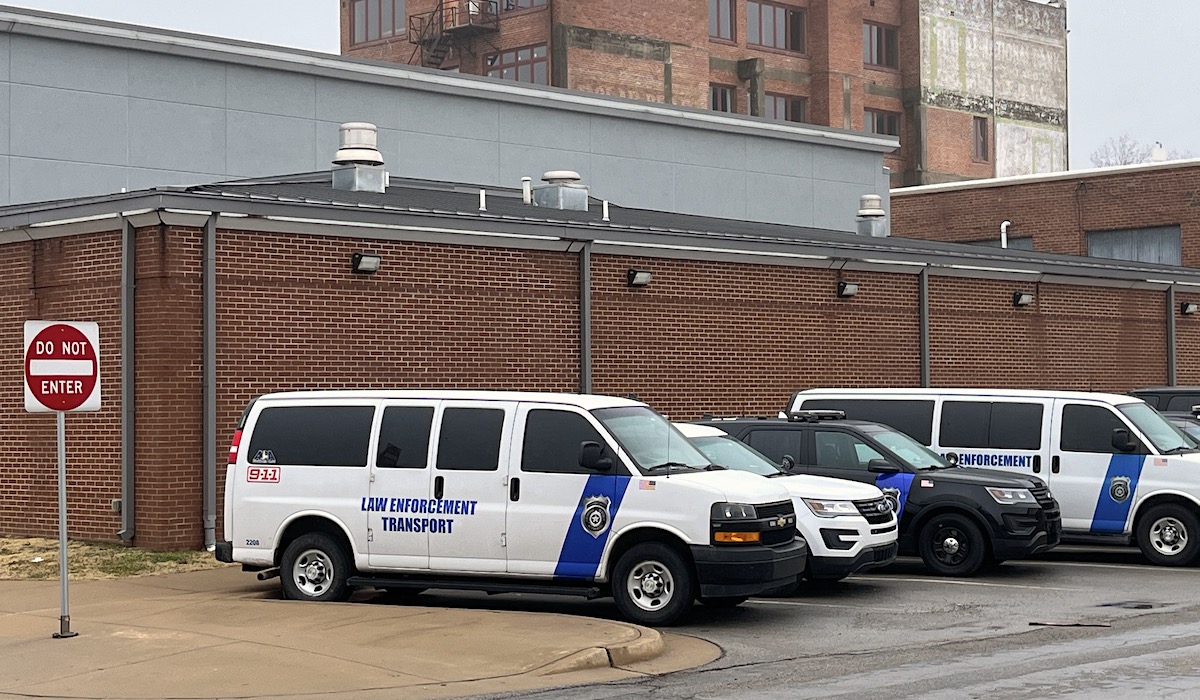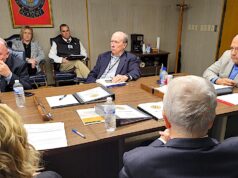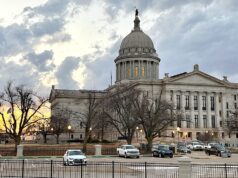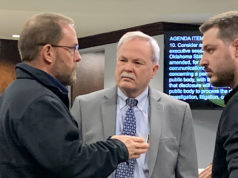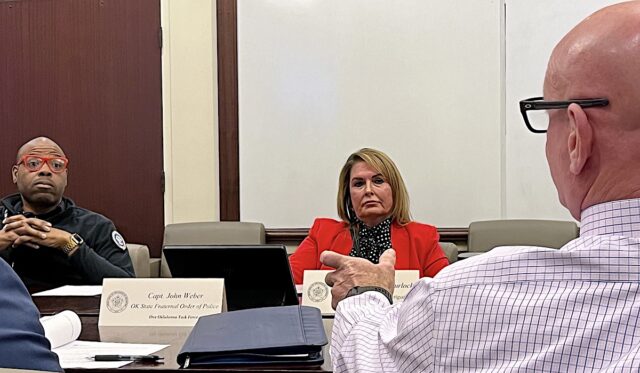

Six weeks after proposing a potential revision and update to the 2005 Master Deputation Agreement between state and tribal law enforcement agencies, members of the One Oklahoma Task Force instead decided this morning to pursue sub-arrangements under the existing agreement.
In doing so, the gathered leaders of state law enforcement agencies discussed adverse impacts faced by the state owing to complicated differences in adjudication systems, including how fees are and are not collected and remitted following arrests of tribal citizens within Indian Country reservation boundaries.
Deputy Attorney General Justin Wolf said he and his colleagues reviewed the Master Deputation Agreement following the task force’s March 11 meeting.
“At the end of that review, frankly, we believe the challenges outweigh the benefits of working from that document or from trying to edit or otherwise rework the Master Deputization Agreement of 2005,” Wolf said. “It’s been in place and active and signed off on by most parties. So broadly speaking, we believe the better solution would be to work sub-agreements off of that Master Deputization Agreement.”
As conversation ensued over how to standardize state-tribal arrangements on topics like jail contracts, bond schedules, juvenile offender processes, warrant checks and fee remittances, task force members said “boundaries” for agreements would be valuable.
“I would certainly propose toward the recommendations that [we try to create] a universal, consistent technology that works with all 77 county courts and our detention facilities (…) and the (tribal) entities as well,” said Chairwoman Tricia Everest, who serves as Gov. Kevin Stitt’s secretary of public safety.
Stitt created the task force in December after an altercation inside the Okmulgee County Jail between county detention officers and Muscogee Nation Lighthorse police who were attempting to book a non-tribal drug possession suspect under their authority as cross-commissioned officers for the Grand River Dam Authority’s police force. The Muscogee Nation filed a criminal charge against one jailer, GRDA suspended its cross-commission of Lighthorse officers, and Oklahoma Attorney General Gentner Drummond asked a federal court to invalidate the tribe’s charge against the jailer because he is not a tribal citizen. That case is pending.
“There is going to be a lot of value if we can get all 77 counties involved,” said John Weber, third vice president for the Oklahoma State Fraternal Order of Police. “However, I think you guys know a lot of the issues at hand.”
About 30 minutes later, one of those issues drew significant discussion: how arrest and adjudication fees typically paid by offenders to the state are handled for tribal citizens arrested by state law enforcement in eastern Oklahoma.
Marcus Williams, assistant director of the Council on Law Enforcement Education and Training, said CLEET estimates it is no longer receiving about $1.6 million annually in fees that would have been remitted to the agency by tribal citizens prior to the 2020 landmark U.S. Supreme Court decision in McGirt v. Oklahoma.
The decision affirmed the existence of the Muscogee Nation Reservation, and subsequent decisions by the Oklahoma Court of Criminal Appeals have affirmed reservations for the Cherokee, Chickasaw, Choctaw, Seminole, Quapaw, Ottawa and Peoria nations. Tribal citizens arrested within Indian Country reservations can only be prosecuted by tribal courts or the federal government.
“We’re looking at it from a perspective of fees,” Williams said. “Currently, we have so many different agencies that are doing their own interlocal agreements on citations or whatever the case might be, that $10 they are supposed to collect and send to CLEET, sometimes the tribal entities they are giving the money back to — whether it’s the sheriff or to the municipalities — so I do think the tribal entities are trying to do what they’re supposed to do, but now from where it left the state to go to tribal entities and they gifted it back to the state, that’s where we’re kind of having the hang-up of, ‘Are we receiving the appropriate dollars we are supposed to?'”
Cherokee County District Attorney Jack Thorp, who praised tribes’ working relationships with his office at the March 11 meeting, said the fee issue should be addressed.
“That’s something that has got to be figured out,” Thorp said.
Williams said the issue affects the Department of Public Safety and the Oklahoma State Bureau of Investigation, as well as his agency.
“CLEET is a small agency, so it greatly affects us,” Williams said. “We didn’t understand this until we started to dig into it, but this is far beyond a traffic ticket. This is every criminal offense that is charged (against a tribal citizen in Indian Country).”
DPS Commissioner Tim Tipton said the amount of fees no longer secured by Oklahoma Highway Patrol troopers who write tickets and make arrests in Indian Country has been estimated to be about $2.5 million annually.
“I don’t know if there are any state agencies that have any agreements with any tribes to collect that (fee schedule),” Tipton said. “We’ve had tribes tell us, ‘Hey, we’re holding back the state revenue that that would generate,’ but we haven’t even discussed it with them from the aspect of that (being) in statute. That doesn’t just go to DPS. A trooper stops somebody and writes them a ticket, there are very few citations that any revenue comes back (to us) for small specific areas. But to me, that would be circumventing what the Legislature has set up in the whole bonding schedule as to where all that money is divided up amongst all these retirement funds and the indigent defense fund and all this stuff.”
Williams agreed, referencing OSBI’s laboratory fees and other types of fees. He said CLEET’s total budget is about $10 million.
“It’s a lot of shortfalls happening because of that,” he said. “For us, it’s almost a $1.6 million loss in fees. (…) That’s a very significant amount of money for CLEET.”
OSBI director Aungela Spurlock said she mentioned the lost fee revenue during her agency’s budget hearing with the Senate earlier this year.
“It’s something we have been tracking. So we looked at four years pre-McGirt and four years post-McGirt to find an average of what our fee collection is,” Spurlock said. “The Senate had recommended some replacement funds, so I think they’re starting to understand the significance of the impact of the fees on some of our agencies.”
Indeed, the Senate’s OSBI appropriation proposal includes $1.25 million in “replacement funds for McGirt,” among other line items for the agency. The House spreadsheet, however, is about $27.8 million lower than the Senate’s proposal, and that specific line item is not included. Neither chamber has proposed funding specific to the fee issue for either CLEET or DPS.
Luttrell: Tribal leaders ‘are interested in what we’re finding’
The Oklahoma Legislature has two members on the One Oklahoma Task Force, which Stitt ordered to produce its report of policy recommendations by June 1. Sen. Jessica Garvin (R-Marlow) and Rep. Ken Luttrell (R-Ponca City) both attended Monday’s meeting, with Luttrell relaying feedback about the March 11 meeting from tribal leaders, who collectively have chosen not to accept a pair of seats at the table proposed in Stitt’s executive order.
“The tribes I have visited with have been very interested with what we are doing here with the task force. Their concern is (…) that we are going to start again from ground zero, which scares the tribal leaders that I’ve spoken with,” Luttrell said. “There are feelings that have been expressed to me that they feel like this task force is going to be productive. They have chosen not to come and sit in the room, but I can assure you they are interested in what we’re finding and what we’re looking at.”
The chosen absence of tribal leaders has left Luttrell, a Cherokee citizen and co-chairman of the Legislature’s Native American Caucus, in the position of speaking about tribal governments without speaking on their behalf.
“I think many of the tribal leaders felt like there was just going to be a witch hunt and pointing fingers at the tribes and telling the tribes they need to get along and they need to follow protocol or whatever,” he said. “So I am encouraged that you guys came up with (the idea) that we could come up with sub-agreements and add to what is there. That’s going to be a lot easier for the tribal leaders to digest.”
After the meeting, Luttrell said a clear picture of where the money is flowing and where it is supposed to go statutorily should be sketched out.
“It’s concerning, especially when those state agencies have to come to the Legislature looking for what would basically be a supplement, because they’re not receiving their funds,” Luttrell said. “Part of my concern is where those funds are ending up. Are they being kept by the city and county governments? Are the tribes keeping them? Where’s the breakdown? Is it something that we need to fix in the Legislature?”
RELATED
Jail fracas fallout: GRDA drops Lighthorse cards, tribes toss task force, Drummond intervenes by Tres Savage & Tristan Loveless
Luttrell noted that the Cherokee Nation has numerous agreements with counties and municipalities to remit fees back to those governments, minus a small processing fee. However, he pointed to one municipality as an interesting example of a community not wanting to sign new agreements.
“It was enlightening to me that one of the municipalities — Sallisaw, in particular — their city council would not sign a memorandum of understanding to have those fines — traffic fines, whatever they were — reimbursed to them,” Luttrell said. “It scared their [city council] to enter an agreement with Cherokee Nation, and they’ve had law enforcement cooperation with them for 30 years. But the fines scared them. So they don’t have a fee reimbursement agreement with Cherokee Nation from Sallisaw.”
Garvin said the task force has a lot to consider based on the day’s discussion.
“It’s obviously a very complex issue, because while we want to ensure that the fees and fines that are supposed to be going to the state agencies are going there, we have to look at it from the other perspective where our counties and municipalities are really struggling for funding as well,” Garvin said. “And so you’re basically robbing Peter to pay Paul, and statutorily we have an obligation to be giving those funds to those specific agencies.”
Tipton, the DPS commissioner, said after the meeting that each sovereign tribal government with an affirmed Indian Country reservation “looks at this differently.”
“Of course, we have tribes like the Chickasaws or Choctaws that are very engaged with us, and we work with them daily. So it varies. It’s not just Oklahoma government and how they’re working with tribal governments, it’s Oklahoma with all these variety of sovereign government entities and what level of resources they have, what their partnerships look like. A ‘patchwork’ would be the right term (…) because it’s all applied differently from tribe to tribe.”
Tipton, who said his son’s first job in law enforcement was as a Chickasaw Lighthorse officer, said coordinating technology and systems could make things safer for law enforcement and the public. For instance, he said, even OHP troopers cross-commissioned by a tribe can have trouble trying to check whether a tribal citizen has an active arrest warrant issued by a tribal court.
“It’s such a patchwork of systems and clarity of how they apply laws in their particular sovereign reservation area, and so I think that’s one of the main things for this task force to do,” Tipton said. “I mean, McGirt is McGirt. It’s the law of the land. So in a post-McGirt Oklahoma, how do we make this as least cumbersome and as least confusing and as safe for every police officer in the state? Not just troopers and deputies and municipal (officers), but for tribal officers. I want it to be safe for them, too, to be able to do their job. So how do we fix this and work together to get consistency across eastern Oklahoma especially?”









